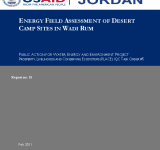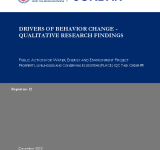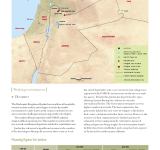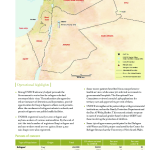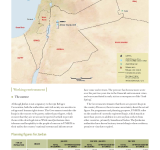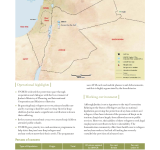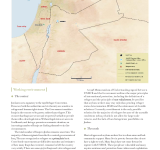والاحتياجات
The report is based on a field assessment of 16 desert campsites in the city of Aqaba – Wadi Rum and Dieseh districts to evaluate these camps’ energy needs and their current energy situation. As part of the Public Action for Water;; Energy and Environment Project (PAP);; a public education and behavior change communication program developed to support USAID’s technical and policy investments in the Jordanian water and energy sectors;; the report assesses the current government policies and behaviors related to the issues of water;; solid waste and energy at campsites in Wadi Rum and Dieseh. The fieldwork of the report was designed to assess current campsites’ situation and energy profile;; evaluate how to reduce their energy needs;; and assess the possibility of installing renewable energy for electricity. The report concludes with several recommendations such as the enhancement of energy efficiency;; re-design of the electrical lighting systems;; re-wire of the electrical circuits;; and enforcement of laws and regulations.
The report aims to understand the outlook of Jordanians;; the key determinants of behavioral change in search for “drivers” that can be used in programs promoting conservation of water or energy and reduction of solid waste. This research was conducted as part of the Public Action for Water;; Energy and Environment Project (PAP);; which aims to encourage water and energy conservation and to support behavior change towards more conservation and efficient practices both at the household level and in the commercial;; industrial and civil society arenas using social marketing behavioral methods. It is based on the qualitative research that focuses on identifying people’s motivations;; needs and desires to help formulating social marketing programs and developing adaptive capacity in individuals and groups. Some of the key questions of the qualitative research include “What are the current coping behaviors and attitudes (psychological;; social;; etc …) of the Jordanian public (disaggregated by gender;; age;; geography and income) in the face of limited water availability and high prices for energy?;; What anticipated consequences may the Government face if stricter scenarios were imposed on water and energy? The report recommends the Ministry of Education to cooperate and introduce regular classes that focus on showing youth the direct impact of water;; energy and environment on their lives and raise awareness and consciousness of children regarding their role in the environment and influence it in a positive way.
This report provides an overview of UNHCR operations profile in Jordan in 2013. It includes an summary of the situation of refugees and asylum seekers in Jordan;; their figures and UNHCR's reponse in terms of strategies and projects.
This report provides an overview of UNHCR operations profile in Jordan in 2011. It includes an summary of the situation of refugees and asylum seekers in Jordan;; their figures and UNHCR's reponse in terms of strategies and projects.
This 4 page fact sheet provides information about Iraqis in Jordan including UNHCR's reponse to them in 2012.
This 5 page fact sheet provides information about Iraqis in Jordan including UNHCR's reponse to them in 2010
This 5 page fact sheet provides information about Iraqis in Jordan including UNHCR's reponse to them in 2010-2011.

